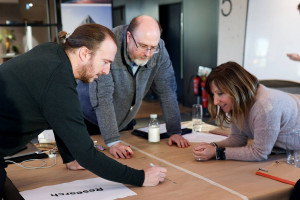10 tips for climate comms success
Designing climate change communications for people outside of the bubble

Over the past 4 months, we’ve been knee-deep in research, arguments and creative exploration for Count Us In, a new community that aims to mobilise 1 billion people globally on climate action. In the process we’ve learnt a lot about how to talk about climate to a mass audience, with a particular focus on how to get this group to act. In no particular order, written at speed and over coffee on a late thursday afternoon, here’s a few headlines on what we learnt.
#1: Don’t forget the middle.
It’s easy to forget there is a mass mainstream audience out there that has a role to play. Conversations on climate change can often focus on two groups - the 100 or so companies that contribute 71% of climate emissions, and the already-active campaigners associated with groups like Extinction Rebellion. But it's worth remembering that both are part of a bigger system. Many mainstream audiences may not be attending protests, but the majority DO care about climate - in 27 countries including the UK, India, and the U.S., 90% consider climate change as a ‘very serious’ or ‘somewhat serious’ issue (Globescan, 2020). It's worth remembering how important appealing to the mass middle is for both political and corporate players, and therefore how much influence they can have within the greater system as a whole. And not only that, but individual lifestyles of the affluent and middle class do play a key role in shaping the market conditions for carbon pollution - according to one recent report accounting for up to 72% of global emissions. In short, both through direct actions and political influence, the mass majority has a key role to play in reducing carbon pollution.
#2 Accept that no one gets it, really.
Even at a basic level, most people don’t understand climate change. They don’t know why it’s happening, or why it’s bad. Many audiences won’t connect recent events like wildfires to climate change. And even fewer will understand that activities like construction, air travel or eating meat are significant contributors to it. While you’ll need to resist the temptation to explain everything (it won’t work - but more on that later), you’ll need to find simple ways to connect the dots between what will be seen by many as unrelated issues.
#3 Find a new language.
Over the last ten years, most of us have heard a lot about saving the planet, going green, protecting the trees, worrying about global warming. These words have been used so much that most mass audiences don’t notice them any more. And if they do, they conjure up images of the organisations that have used them extensively in recent years like Greenpeace and can quickly signal your communications aren’t for people like them. Sure, it's about climate - but if you want new audiences, you need to find a new way in.
#4 Avoid the lefty lean.
Sure, climate change is an intersectional issue, bound up with questions of migration, global justice and market systems. On a personal level, we might see these issues as intractably linked, but bundling up carbon pollution with broader socio-political value systems creates a pretty huge hurdle for many individuals who would otherwise be open to action on climate. If you want fast take up and immediate action, try to unbundle climate from broader political debate.
#5 Remember future tense doesn’t work for everyone.
A left-leaning audience tends to be activated by visions of a better future on a grand scale - building better society. Right-leaning audiences tend to place more emphasis on the restoration of the past or a protection of what still exists of it. So don’t talk about building a better world and expect everyone to jump for joy. Different groups need different framing - and even different grammatical tenses.
#6 Provide an immediate reward.
Most human beings are hard-wired to give preference to present-day realities and immediate benefits. Even though the timelines of ecological collapse can seem terrifyingly short, it’s still far too far away for many, and quickly gets eclipsed by the priorities of the next days, weeks and months. Communicators can rail against this - or embrace the fact that creating immediate reward is often key in helping people make the switch from something they might do, to something they WILL do today. In this respect, issues like air pollution are definitely the Top Trumps of the climate communications card deck, since more emissions from transport are not only a major cause of carbon pollution but also directly correlate with more tangible benefits to air quality and health in the immediate term. In a similar spirit, the emotional benefits of walking more are more likely to trigger people into action than the associated carbon reductions, and the promise of saving money is probably the easiest way to nudge people into committing to more energy efficient homes.
#7 Don’t make it a crisis.
Look - we know, it IS a crisis. And it's easy for that to be the first thing that comes out when you’re trying to motivate people. And it's a common strategy - see Milton Glaser’s recent Earth Is Dying campaign. But the truth is as a communications strategy to mobilise a mass audience, it's pretty ineffective. Crisis communications tend to slide by - discounted as too extreme, ignored as too depressing, or acting to convince a persuadable audience there is no chance to effect change.
#8 Explaining isn’t enough.
For those who are already committed to the climate cause, it's easy to feel - if only people understood, they would act. If only they would listen to us. And it quickly becomes a question of logical explanation - carefully laying out the issues at stake. The brute truth is that this will often fail. This target will not respond to logic alone, and any time you find yourself falling into explainers… take care. Many people have tried rational arguments already. From our experience, it seems starting with emotion is far rich richer - acknowledge how they are likely to feel - worried, stuck, powerless, and help them move towards a place where they are part of the answer.
#9 Messenger beats message.
Surprisingly, quite different socio-political groups audiences respond fairly consistently to messages that explain climate change and what people can do. But the messenger has a huge role to play. Put simply, the exact language matters much less than whether those words come from the mouth of Jeremy Corbyn, Jeremy Clarkson or Kylie Jenner. So choose your messengers carefully. And who do most people trust most? Their friends and family. So whatever you are trying to do, make person-to-person communications a key part of your strategy.
#10 Find a way to get started.
Achieving our climate goals over the next decade requires massive changes at all levels, and passionate activists are quick to discount easy or simplistic ways into the issue. We can’t make the changes needed by going half-vegetarian, so why bother? There’s an argument to be made for this kind of absolutism, but we shouldn’t ignore the ways that action and belief are connected in individual behaviour change. Taking the first small steps in our own lives may not, but does tend to play an outsize role in shaping our own beliefs - our image of who we are, what we value, and what we expect from others. In doing so, these kinds of first steps provide a gateway for further, more significant action from individuals, creates ripples across social groups and fosters the expectation that others - friends, governments, companies - should do their bit too. So even if half of France eating less meat did not make a noticeable indent on carbon pollution, it could play a key role in reshaping the political landscape around climate change. And hey France, we’re not picking on you, it's just an example. We love those steak frites, too - just maybe once a month, huh?
--
That's it. The world needs radical and fast action from all of us. But getting people to be part of that change requires a more subtle approach than we often see from the third sector. We can’t try to alter who people are - but need to get better at finding ways to meet people where they are, welcome them in and help them play their part. As the experts from Yale told us,
1. Scientists Agree.
2. It's Real.
3. It's us.
4. It's bad.
5. But there is hope.
Here’s to everyone out there working to turn hope into practical action. We’ll see you on the frontline.



